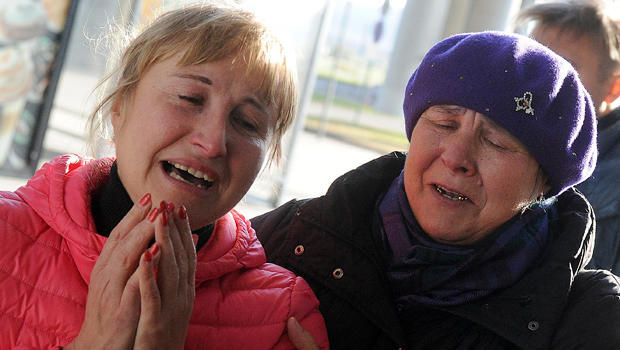Russia dismisses ISIS' claim on downed jet
SHARM EL-SHEIKH, Egypt - A local affiliate of the extremist Islamic State of Iraq and Syria (ISIS) claimed it "brought down" the Airbus A321-200 that crashed Saturday in Egypt with 224 on board. However, Russian officials dismissed the claim, while admitting the plane did appear to break up "in the air" before coming down.
The crash happened in the general area of northern Sinai where Egyptian security forces have for years battled local Islamic militants who in recent months claimed allegiance to ISIS.
The Egypt-based extremists claimed they took the plane down "in response to Russian air strikes that killed hundreds of Muslims on Syrian land," according to Reuters.
The militants, however, did not offer any evidence to back up their claim. Russia's Transport Minister Maxim Sokolov told Interfax news agency the claim "can't be considered accurate."
Militants in northern Sinai have not to date shot down commercial airliners or fighter jets. There have been media reports that they have acquired Russian shoulder-fired, anti-aircraft missiles. But these types of missiles can only be effective against low-flying aircraft or helicopters. The Russian airliner that crashed on Saturday was cruising at 31,000 feet when it lost contact with air traffic controllers, according to Egyptian aviation officials.
CBS News' Alex Ortiz reports from Cairo that online flight trackers show that the plane had reached a cruising speed of 400 knots before suddenly dropping to 28,000 feet and dramatically slowing to 93 knots. Then contact was lost.
A Russian aviation official said on Sunday the plane "broke up in the air," adding that it was too early to talk about conclusions from the crash, Russian news agencies reported, according to Reuters. Viktor Sorochenko, an official with the Intergovernmental Aviation Committee, made the comments after inspecting the crash site.
An Egyptian ground service official who carried out a pre-flight inspection of the Russian passenger plane that crashed in the Sinai Peninsula said Sunday that the Airbus A321-200 appeared to be in good condition.
The Metrojet plane, bound for St. Petersburg in Russia, crashed 23 minutes after it took off from Egypt's Red Sea resort of Sharm el-Sheikh on Saturday morning. The 224 people on board, all Russian except for four Ukrainians, died.
The Egyptian official, who spoke on condition of anonymity because he was not authorized to speak to the media, said he was a member of a technical inspection team that included two Russians.
"We are all shocked. It was a good plane. Everything checked out in 35 minutes," the official told The Associated Press. The closest the plane came to being in trouble, he said, was three months ago when the pilot aborted takeoff halfway through because of a system error.
"That's almost routine though," he said.
However, a Russian TV channel late on Saturday quoted the wife of the co-pilot as saying her husband had complained about the plane's condition. Natalya Trukhacheva, identified as the wife of co-pilot Sergei Trukhachev, said a daughter "called him up before he flew out. He complained before the flight that the technical condition of the aircraft left much to be desired."
Another Egyptian official had previously said that before the plane lost contact with air traffic controllers the pilot had radioed and said the aircraft was experiencing technical problems and that he intended to try and land at the nearest airport.
Meanwhile, Dubai-based Emirates, the Middle East's largest carrier, said on Sunday it has stopped flying over Egypt's Sinai until more is known about the crash of the Russian airliner.
It joins two major European airlines, Germany's Lufthansa and Air France, that announced following the crash Saturday that they would immediately stop flying over Sinai for safety reasons until the cause of the crash was determined.
Russian Transport Minister Maxim Sokolov and Emergencies Minister Vladimir Puchkov arrived in Egypt late Saturday to join their Egyptian counterparts overseeing the investigation at the crash site, a remote mountainous region in northern Sinai. Authorities had already recovered at least one "black box" flight data recorder.
Also joining the effort on Sunday were officials from France's BEA accident investigation agency, involved because the Airbus A321-200 jet was designed in France. The team included two BEA investigators and six technical advisers from Airbus. The BEA said the team would be joined by two investigators from its German counterpart BFU, because the plane was manufactured in Germany, and four investigators from its Russian counterpart MAK, because the plane was operated by a Russian company.
Two Russian teams of search and rescue experts have also arrived in Egypt and were headed to the crash site to assist in the recovery of bodies.
The Egyptian Cabinet said Sunday that 163 bodies have so far been recovered and sent to morgues in Cairo.

